
Creative Writing
You are here
- Home
- Schools
- School of Arts & Humanities
- English & Creative Writing
- Creative Writing
- Postgraduate Research
- PhD Students
PhD Students
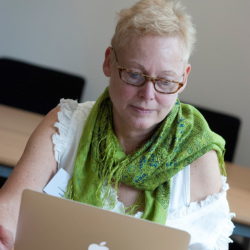
Sarah Bower
For my practice-based PhD I am writing a two-period novel about pioneering flight, from hot air balloons to the Apollo Moon landing. My research interest is in how voice and imagery in the multi-period novel forge links between periods.
I studied at Sheffield Hallam University and the University of East Anglia where I gained my MA in Creative Writing. My first novel, The Needle in the Blood, won the Susan Hill Award 2007. My latest publication is a novella, Lines and Shadows, 2023. My work has been supported by awards from Arts Council England and the Royal Literary Fund.
I am an Associate Lecturer at The Open University and have also taught at UEA and Lingnan University in Hong Kong where I developed a Creative Writing programme to support English language teaching. Conversations between languages through literary translation remains a particular interest.
My supervisors are Dr. Joanne Reardon and Dr Ed Hogan.
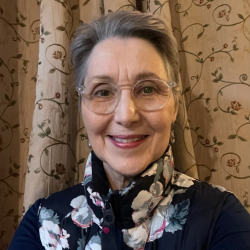
Elizabeth Clack
I completed my BA and MA with The Open University and am pursuing a part-time PhD. My thesis combines a novel set in Edwardian London theatreland focusing on stage illusions and magicians’ performances. I aim to subvert the Gothic theme by empowering the central female character, incorporating ideas from cartomancy, necromancy, conventional magic, and Gothicism. As my novel progresses, my critical commentary examines how the creative component engages with the Gothic trope of the subjugation of women for entertainment and how this contributes to my intention to subvert the central female role to create a neo-Gothic novel.
I presented a film discussing cartomancy at a PhD English and Creative Writing event. I aim to submit a thesis to the Magic Circle investigating the impact of women in magic since they were first permitted to join the Magic Circle in 1991.
My supervisors are Dr Lania Knight and Dr. Edward Hogan.
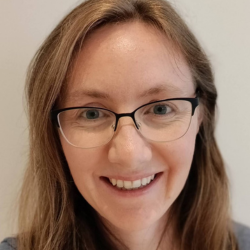
Heather Fishwick
I am a part-time PhD student working with classical mythology to explore how writers use, and reuse, characters, setting and scenarios to reflect their own reality. My novel focuses on the Trojan princess, Cassandra, and I am interested in exploring her presentation in myth and contemporary retellings, in particular her often stereotyped depiction as a “frantic prophetess” pulling at her hair as she prophecies doom.
I studied for my Masters in Creative Writing at Manchester Metropolitan University and an undergraduate degree in English and Latin Literature at the University of Warwick.
My supervisors are Dr. Joanne Reardon, Dr. Emma Bridges and Dr. Chella Ward.
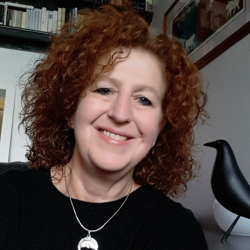
Gwyneth Jones
I am a writer of short-form fictions published under the name Jupiter Jones. My writing has twice been awarded the Colm Tóibín International Short Story Prize and a recent novella was shortlisted for the Saboteur Award.
I have studied at The Open University for Masters in Humanities and in Creative Writing, and I have a PhD from Goldsmiths on the subject of spectatorial embarrassment. I am currently studying for a practice-based PhD using both creative and critical approaches to exploring the role of (dis)connectivity in the literary hybrid form of the novella-in-flash. The subject of my creative work is Fanny Imlay and her relationships with her half-sister Mary Shelley and their stepsister Claire Clairemont.
My supervisors are Dr. Jane Yeh and Dr. Emma Claire Sweeney.
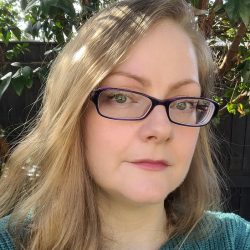
Zoe Marriott
My OOC DTP funded PhD focuses on timeslip fiction, utilising Creative Writing to explore subjective experiences of time, memory, and history, and how these can be linked to concepts of non-linear time in theoretical physics. I graduated from Kingston University in 2020 with an MA in Creative Writing, with distinction, and was the winner of the Kingston 2019-20 Creative Writing MA Prize.
I am the author of nine YA novels which draw strongly on world folklore and mythology. My writing has won the Hillingdon Book award, The Great Britain Sasakawa Prize, a USBBY Outstanding International Book listing, and a Junior Library Guild Selection, among others. From 2017-2019 I was the Royal Literary Fund Fellow at York St. John University. My writing has been supported by grants from Arts Council England, the Society of Authors and the Royal Literary Fund.
My supervisors are Dr. Joanne Reardon and Dr. Edward Hogan.
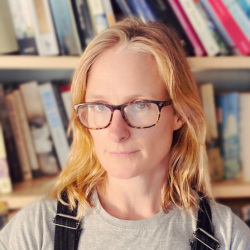
Rebekah-Lattin Rawstrone
My creative practice PhD combines a novel and critical thesis centred around the life of Gertrude Bell (1868-1926). As a distant relative of Bell, my novel uses multiple perspectives – including a personal one – to explore the controversies of Bell’s life, from her hand in establishing modern day Iraq, to whether her overdose was really suicide. Both novel and thesis examine the ways in which we tell and use stories of the past, searching for new approaches to collective and individual storytelling that might help us think and act differently in the present.
I have a Masters in Creative Writing from Birkbeck, University of London, a Masters in ‘Issues in Modern Culture’ from University College London, and a degree in English from Cambridge University. My fiction has received Arts Council funding and my PhD is funded by the OOCDTP.
My supervisors are Dr. Emma Claire Sweeney and Dr. Fiona Doloughan.
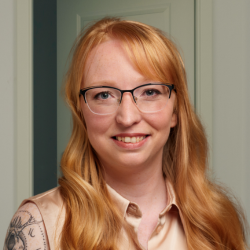
Katie Robinson
My research-as-practice PhD combines a short story collection and critical theses exploring the disabled body in horror fiction. I intend to explore whether it is possible to have plausible portrayals of the bodies and voices of characters with invisible disabilities while still respecting the generic conventions of horror.
My publishing history comprises one novella, A Man in Winter published by Brigids Gate Press in July 2022, which was a finalist in the Eric Hoffer Awards. I have also published several short stories including, Scratching in The Horrorzines Book of Ghost Stories which came out in July 2020 and won Best Anthology in the 23rd Annual Critters Readers’ Poll. In Aug 2021, I had a short story published in the Water: Selkies, Sirens and Sea Monsters anthology, which won the Douglas Barbour Award in September 2022.
My supervisors are Dr. Samuel Sargeant and Dr. Molly Ziegler.
Request your prospectus
![]()
Explore our qualifications and courses by requesting one of our prospectuses today.